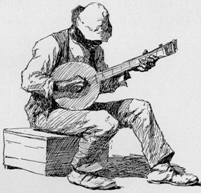
Painting © 2004 Loz
Arkle
Website
© Copyright 2000-2011 Alan White - All
Rights Reserved
Site optimised for Microsoft Internet Explorer
Mule, Get Up In The Alley |
||||||||||||||||||||
|
In 1896, Joel Chandler Harris confessed: “So far as I know, ‘Bango’ is a meaningless term, introduced on account of its sources ruggedness.” .(1) However, “A story by an African descendant, ‘Dick the Negro’ quoted by John Davis (1803-1881) describes another aspect of life before the American War of Independence (1775-1783): I made my court to a wholesome girl who had never bored [pierced] her ears, and went constantly to meeting … by moonlight I used to play my ‘banger’ under her window, and sing a Guinea love-song my mother had taught me.” (2) This is “quoted in Epstein 1973:81)”. (3) The author is referring to Sinful Tunes & Spirituals by Dena Epstein, still an essential read to the blues historian. On first glance, as I presumed so with Harris, it would be a common enough understanding in the English-speaking world to render ‘bango’ with a hard ‘g’. Including as it does the word ‘bang’ associated with a loud noise or explosion. But the above African tale definitely indicates a musical instrument, the ‘banger’ or banjo. The latter was spelt dozens of different ways, and as well as Dick the Negro’s ‘banger’, also included ‘banza’, ‘banja’, ‘banza’, ‘bangoe’, etc. and ‘banjo’ itself appeared at least as early as 1774. (4) Therefore the phrase in the song collected by Joel Chandler Harris which runs: ‘Up ‘n down de Bango’ refers to a player’s fingers running up and down the neck of a banjo-fretless or otherwise; while serenading the current lady of his dreams.
Copyright Ó Max Haymes 2012 __________________________________________________________________________
__________________________________________________________________________ Notes:
Additions/Corrections &
Transcriptions by Max Haymes.
Website © Copyright 2000-2012 Alan White. All Rights Reserved. |









